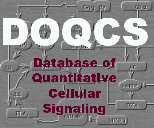
|
Enter a Search String | | Special character and space not allowed in the query term.
Search string should be at least 2 characters long. |
Molecule Parameter List for L.EGFR | The statistics table lists the distribution of a molecule acting either as a substrate, product, enzyme or as a molecule within the network.
The text color of a molecule is highlighted by  color. color. | | Statistics |
Accession and Pathway Details | |
| Accession Name | Accession No. | Accession Type | Pathway Link | Synaptic_
Network | 16 | Network |
Shared_Object_Synaptic_Network, PKC, PLA2,
PLCbeta, Gq, MAPK,
Ras, EGFR, Sos,
PLC_g, CaMKII, CaM,
PP1, PP2B, PKA,
AC, CaRegulation | This model is an annotated version of the synaptic signaling network.
The primary reference is Bhalla US and Iyengar R. Science (1999) 283(5400):381-7 but several of the model pathways have been updated.
Bhalla US Biophys J. 2002 Aug;83(2):740-52
Bhalla US J Comput Neurosci. 2002 Jul-Aug;13(1):49-62 |
L.EGFR acting as a Molecule in Synaptic_Network Network
| Name | Accession Name | Pathway Name | Initial Conc.
(uM) | Volume
(fL) | Buffered | | L.EGFR | Synaptic_
Network
Accession No. : 16 | EGFR
Pathway No. : 77 | 0 | 1000 | No | | This is terribly simplified: there are many interesting intermediate stages, including dimerization and assoc with adapter molecules like Shc, that contribute to the activation of the EGFR. |
L.EGFR acting as an Enzyme in Synaptic_Network Network
| | Enzyme Molecule /
Enzyme Activity | Accession Name | Pathway Name | Km (uM) | kcat (s^-1) | Ratio | Enzyme Type | Reagents | | 1 | L.EGFR /
phosph_PLC_g
| Synaptic_
Network
Accession No. : 16 | EGFR
Pathway No. : 77 | 0.333333 | 0.2 | 4 | explicit E-S complex | Substrate
Ca.PLC_g
Product
Ca.PLC_g*
| | | Hsu et al JBC 266:1 603-608 1991 Km = 385 +- 100 uM, Vm = 5.1 +-1 pmol/min/ug for PLC-771. Other sites have similar range, but are not stim as much by EGF. These rates are improbably slow and are for the intracellular domain of EGFR alone. Wahl et al JBC 267(15) 10447-10456 1992 reports a tau of 5min for activation of PLC-gamma in vivo. Also Sherrill and Kyte say turnover # for angiotensin II is 5/min for cell extt, and 2/min for placental. Also see Okada et al JBC 270(35) 20737-20741 1995 for Shc rates where Km = 0.7 and Vmax = 4.4 pmol/min To achieve these turnovers and time-courses, we may need to consider the membrane-plane action of the the receptor, but for now the rates are consistent with the Wahl et al reports. | | 2 | L.EGFR /
phosph_Shc
| Synaptic_
Network
Accession No. : 16 | EGFR
Pathway No. : 77 | 0.833333 | 0.2 | 4 | explicit E-S complex | Substrate
SHC
Product
SHC*
| | | Rates from Okada et al JBC 270:35 pp 20737 1995 Km = 0.70 to 0.85 uM, Vmax = 4.4 to 5.0 pmol/min. Unfortunately the amount of enzyme is not known, the prep is only partially purified. Time course of phosph is max within 30 sec, falls back within 20 min. Ref: Sasaoka et al JBC 269:51 32621 1994. Use k3 = 0.1 based on this tau. |
L.EGFR acting as a Substrate in a reaction in Synaptic_Network Network
| Kd is calculated only for second order reactions, like nA+nB <->nC or nA<->nC+nD, where n is number and A,B,C,D are molecules, where as for first order reactions Keq is calculated.
Kd for higher order reaction are not consider. |
| Name | Accession Name | Pathway Name | Kf | Kb | Kd | tau | Reagents | | Internalize | Synaptic_
Network
Accession No. : 16 | EGFR
Pathway No. : 77 | 0.002
(s^-1) | 0.0003
(s^-1) | Keq = 0.165(uM) | 434.783sec | Substrate
L.EGFR
Product
Internal_L.EGFR
| | See Helin and Beguinot JBC 266:13 1991 pg 8363-8368. In Fig 3 they have internalization tau about 10 min, equil at about 20% EGF available. So kf = 4x kb, and 1/(kf + kb) = 600 sec so kb = 1/3K = 3.3e-4, and kf = 1.33e-3. This doesn't take into account the unbound receptor, so we need to push the kf up a bit, to 0.002 This reaction is treated as reversible, thereby making the approximation that the re-insertion of EGFR into the membrane is handled by the same process going backwards. |
L.EGFR acting as a Product in a reaction in Synaptic_Network Network
| Kd is calculated only for second order reactions, like nA+nB <->nC or nA<->nC+nD, where n is number and A,B,C,D are molecules, where as for first order reactions Keq is calculated.
Kd for higher order reaction are not consider. |
| Name | Accession Name | Pathway Name | Kf | Kb | Kd | tau | Reagents | | act_EGFR | Synaptic_
Network
Accession No. : 16 | EGFR
Pathway No. : 77 | 4.2
(uM^-1 s^-1) | 0.25
(s^-1) | Kd(bf) = 0.0595(uM) | - | Substrate
EGF
EGFR
Product
L.EGFR
| | Affinity of EGFR for EGF is complex: depends on [EGFR]. We'll assume fixed [EGFR] and use exptal affinity ~20 nM (see Sherrill and Kyte Biochem 1996 35 5705-5718, Berkers et al JBC 266:2 922-927 1991, Sorokin et al JBC 269:13 9752-9759 1994). Tau =~2 min (Davis et al JBC 263:11 5373-5379 1988) or Berkers Kass = 6.2e5/M/sec, Kdiss=3.5e-4/sec. Sherrill and Kyte have Hill Coeff=1.7 |
| Database compilation and code copyright (C) 2022, Upinder S. Bhalla and NCBS/TIFR
This Copyright is applied to ensure that the contents of this database remain freely available. Please see FAQ for details. |
|
